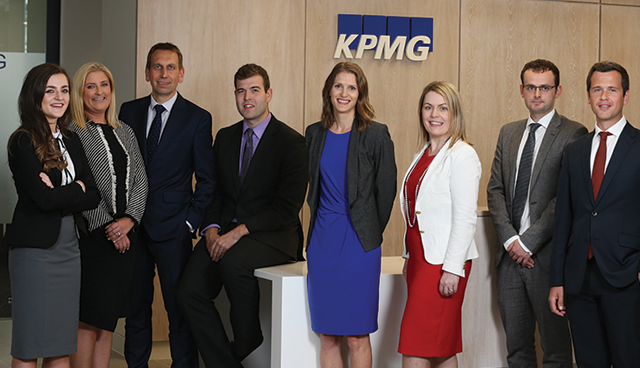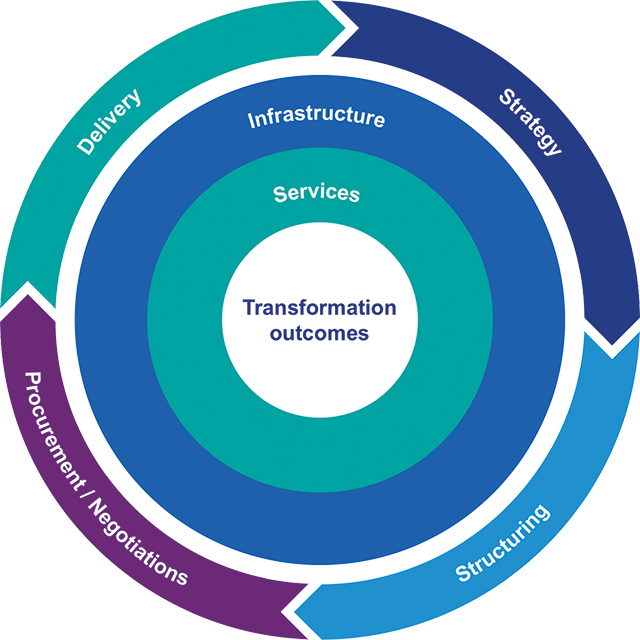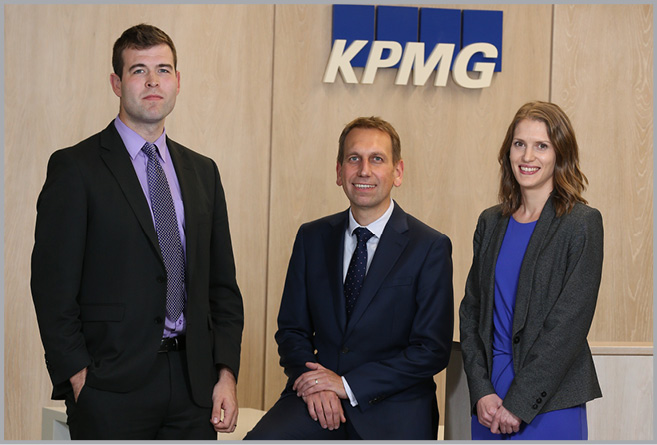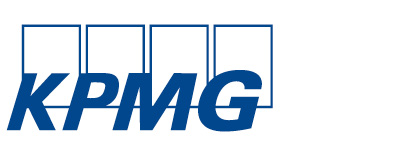Spotlight on KPMG’s Public Sector ‘Deal Advisory’ team


“We advise on the full life cycle of such deals, which can be for policy initiatives, key infrastructure projects or critical services. This lifecycle usually starts with developing the strategy for the deal, before progressing to structuring (including business cases) and onto the procurement and commercial negotiation of the deal, in accordance with public procurement rules. Once the optimum deal has been secured and a contract has been awarded to a preferred supplier, we will support government in its monitoring and oversight of the supplier to ensure the effective delivery of required outcomes from a financial and commercial perspective.”
This 12-strong Public Sector ‘Deal Advisory’ team sits within KPMG’s Corporate Finance practice in Belfast, advising clients across three core business areas.
Deal advisory for infrastructure projects
“One of our key specialisms is providing financial and commercial advice on major infrastructure projects, be that publicly-owned infrastructure for transport, healthcare or education services, or publicly-supported infrastructure such as high speed broadband networks for rural areas, irrespective of how they are funded.
“When we are advising the public sector, our role often commences as soon as the need for new or improved infrastructure has been identified,” explains Chris. “We work with the client to identify and assess the strategy and options, providing an important challenge function to ensure the preferred option really is the best and most cost effective way of meeting the client’s objectives – rather than simply being the most obvious solution.
“When working with the private sector, our involvement will usually begin at the outset of the procurement process. We provide private sector bidders with financial modelling services and advice on financing strategies, raising debt and equity finance and contract negotiations. We also offer advice on bid strategy, preparation and management. We can be of particular assistance when a bidder hasn’t been particularly active in the local market and isn’t familiar with the local nuances.”
The team is currently advising local government on the bid for a Belfast Region City Deal – a “game changing” initiative that will deliver substantial new sources of funding for strategically important infrastructure, innovation and skills projects to boost the economy, drive job creation and ensure that economic growth extends to all areas in the region.
Key aspects of the team’s work

Rachel explains this further in the context of one of her key projects – being the procurement of a new, fully outsourced, 1,700-bed prison delivered by a consortium of private sector and not-for-profit organisations. “Unprecedented growth in prison populations prompted the need for additional accommodation but the Government took the opportunity to raise service standards with the aim of ultimately reducing reoffending in the future.”
To achieve this, Rachel played a key role in the development of a new performance regime which was bankable from a project finance perspective but also incentivised the consortium to deliver new and better services. This included a Payment by Results regime which took into account the reoffending outcomes of inmates following their release from the facility. “The upfront investment in raising standards is expected to be more than offset by future cost savings from lower prison populations – and that’s before the other societal benefits of lower crime are taken into account,”
she concludes.
Strong focus on service contracts
“A common misconception is that financial and commercial advisers are only required when a project is being privately financed,” says Rachel Harrison, an Associate Director in the team.
“That’s not the case. For example, another core element of our work is advising on the procurement of complex service contracts. Similar to infrastructure projects, two of the key factors in securing value for money for taxpayer funds is the development of ‘carrot and stick’ performance incentives for the private sector counterparty and the appropriate allocation of commercial risk between the public and private sectors.”
Rachel recently returned to KPMG in Northern Ireland following a two-year secondment to KPMG Australia, where she led the financial and commercial advice for a number of major infrastructure and service contract procurements.
Another example of the breadth of the team’s work in this space includes advising the Police Service of Northern Ireland on its procurement of business-critical IT systems and related support services, including negotiating the financial and commercial terms of the
IT-managed service contracts.
Supporting government on transformation initiatives
Much of the team’s advisory work is in support of transformational projects, when public bodies are reassessing how they best deliver services. “While this transformation is often prompted by budget constraints, it can also be due to technological advances which alter the most efficient way of doing business and/or reflect changing customer preferences regarding how public services are provided,” says Stephen Wallace, a Manager in the team.
“Globally, KPMG are renowned market-leaders in such initiatives because we understand the challenges around the perceived barriers of transformation, such as an ingrained culture, fear of change, advancements in technology and increased pressure on finances.
“As well as having a dedicated team in Northern Ireland, we also have the ability to scale up resources, drawing on sector-specific teams from across Ireland and the UK as well as providing in depth insight from our global network as to how other countries are dealing with similar issues.”

The team
Chris Rainbird continues: “We have a strong track record in delivering quality advice in these three core areas.
We have a deep understanding of the commercial issues, drivers and solutions that underpin these projects. This is evidenced by the significant amount of repeat business and requests for post-procurement support from our existing clients. The support we provide ranges from advice on the practical application of payment and performance mechanisms to the negotiation of contract change.
“Ultimately this has enabled us to continue to grow our team in Belfast, which has a strong focus on delivering for clients in Northern Ireland.
“We have built a team that is underpinned by a unique weighting towards senior advisors, which means that we wrap a lot of experience around every project.
“Since our ultimate focus is always on quality, we very much concentrate on our strengths and stick to the core areas for which we are so widely renowned. This has enabled us to establish our position as a market leader in the sector and will ensure that we maintain this position going forward,” he concludes.
Stephen Wallace has 10 years of experience advising public sector clients on infrastructure projects and procurements across the UK and Ireland. Below he discusses one of his current engagements at KPMG.
“In May 2017, our Public Sector ‘Deal Advisory’ team in Belfast were delighted to be appointed to advise on a Belfast Region City Deal, which has the potential to be a game changer for the whole Northern Ireland economy. City Deals are an innovative UK Government approach which direct additional funding to infrastructure and innovation projects that boost productivity, employment and economic growth.
“The Belfast region, which covers over one million of our local population, has ambitious plans, which at their core, aim to provide more and better jobs, inclusive growth, improved skills and assist in leveraging private sector investment across the region.
“With significant deprivation and high levels of economic inactivity across the Belfast region; inclusive growth and a parallel skills programme will be a core component of the proposition ensuring a spread of benefits on both a geographic and socio-economic basis. In addition, 37 percent of our graduates leave Northern Ireland with only a third of these people ever coming back to live and work here. The Belfast region needs to reduce the impact of this ‘brain drain’ and ensure that our experienced talent with local roots come back to contribute to our growing economy.”






